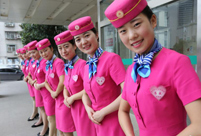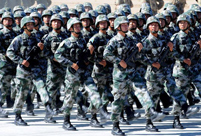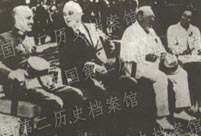 YOG kicks off in Nanjing
YOG kicks off in Nanjing
 Colorful life at Youth Olympic Village of Nanjing 2014 YOG
Colorful life at Youth Olympic Village of Nanjing 2014 YOG
 Royal Taoist temple to open to public
Royal Taoist temple to open to public
 Female soldiers at quake-hit area
Female soldiers at quake-hit area
 Shocking photos of cruel battles in Ukraine
Shocking photos of cruel battles in Ukraine
 Amphibious armored vehicle unit conducts open sea drill
Amphibious armored vehicle unit conducts open sea drill
 Water relay in Henan
Water relay in Henan
 Ethnic culture feasts eyes of travelers
Ethnic culture feasts eyes of travelers
 80 security dogs assembled in Nanjing police dog training base
80 security dogs assembled in Nanjing police dog training base
 Graffiti artists paint on street walls in Xinjiang
Graffiti artists paint on street walls in Xinjiang
NAY PYI TAW, Aug. 27 -- Economic ministers of the Association of Southeast Asian Nations (ASEAN) have expressed wishes to jointly build the 21st Century Maritime Silk Road, agreeing to start negotiations on upgrading the ASEAN-China Free Trade Area (ACFTA).
Chinese Commerce Minister Gao Hucheng attended the China-ASEAN economic ministers' meeting in Nay Pyi Taw, the capital of Myanmar, and briefed the ASEAN ministers on Chinese President Xi Jinping's proposal to build the 21st Century Maritime Silk Road.
The proposal has gained wide understanding, support and positive response from the participating ASEAN ministers, Gao told Xinhua in an exclusive interview Tuesday night.
China's proposal is aimed at making the Chinese and ASEAN economies more complementary and tapping the potential for further cooperation between the two sides so as to find a new starting point, more common interests and new growth areas in the economy for promoting the bilateral strategic partnership, he said.
"The cooperation in building the Maritime Silk Road will focus on economic cooperation and will not touch the military and security areas," he said.
"As a principle, no party in the cooperation will be allowed to interfere in the internal affairs of countries in the region or seek the dominant power in regional affairs."
Secondly, Gao said, efforts will be made to ensure the cooperation should not harm the existing cooperation mechanism in the region, no new regional cooperative organizations or mechanism will be established and the existing cooperative mechanism will be free from any impact.
Thirdly, the key point of cooperation is to promote connectivity in the infrastructure and financial fields of the ASEAN states for realizing a win-win result, he added.
Gao added that some ASEAN economic ministers also wished to bring the issue to the Nanning Expo in mid-September for further discussion.
As the second important achievement of the China-ASEAN economic ministers consultations, Gao said, "We have made it clear that we will initiate negotiations for upgrading the ACFTA."
The ACFTA was established in 2010 after eight years of talks. According to Gao, trade volume between China and the ASEAN has increased at an average annual rate of 21 percent in the past ten years and the ASEAN has become the third largest trade partner of China.
China's investment in the ASEAN countries grew at an annual rate of 45 percent over the past few years. Incomplete statistics show that China's investment in ASEAN nations has exceeded 40 billion U.S. dollars and is growing at a high rate.
Despite the benefits brought by the rapid development of China- ASEAN economic relations over the past decade, both China and the ASEAN agreed the ACFTA can no longer fit the close economic and trade relations and development potential between China and ASEAN.
"So we have reached a consensus that it is necessary to initiate talks for upgrading the ACFTA," Gao said.
After about a year's negotiations, the two sides have worked out key documents and set the framework and objectives for further negotiations.
"The negotiation for upgrading ACFTA is aimed at further strengthening and deepening the cooperation in the fields of economy and technology, goods, services and investment, as well as relevant trade regulations," he said.
It is also targeted at improving the market access to enable both sides to better cope with regional and global challenges, support the implementation of the Maritime Silk Road strategy and realize the China-ASEAN trade target of 1 trillion U.S. dollars in 2020 set by the leaders of both sides, Gao added.
The Chinese minister said he and his ASEAN counterparts also discussed a series of major issues of common concern and reached important consensus.
"The proposal to establish an Asian infrastructure investment bank, raised by the Chinese side, was unanimously agreed by the ASEAN ministers who expressed wishes to take part in the preparations and establishment of the bank as initiators," Gao said.
"We also reached consensus on the signing of the ASEAN-Hong Kong Free Trade Area, which China's Central Government is willing to help Hong Kong sign the agreement at an early date," he added.
 Special holidays
Special holidays World's top 10 fighters
World's top 10 fighters 'Stewardesses' serve in hospital
'Stewardesses' serve in hospital Beautiful night scenery of Nanjing
Beautiful night scenery of Nanjing ‘Peace Mission -2014’ joint anti-terror military exercise kicks off in China
‘Peace Mission -2014’ joint anti-terror military exercise kicks off in China Eye-catching guides at the opening ceremony of YOG in Nanjing
Eye-catching guides at the opening ceremony of YOG in Nanjing A female missile launch company of PLA
A female missile launch company of PLA China, the U.S., Britain and the Soviet Union call for Japan's unconditional surrender
China, the U.S., Britain and the Soviet Union call for Japan's unconditional surrender The biggest duty-free store of the world
The biggest duty-free store of the world Volunteers bid farewell to YOG
Volunteers bid farewell to YOG More police dogs join anti-terror campaign in Inner Mongolia
More police dogs join anti-terror campaign in Inner Mongolia Picturesque Dayilan Manchu village in NE China
Picturesque Dayilan Manchu village in NE China Athletes experience the charm of Chinese traditional opera in Nanjing
Athletes experience the charm of Chinese traditional opera in Nanjing Contestants for Miss Bikini World experience Chinese traditional culture
Contestants for Miss Bikini World experience Chinese traditional cultureDay|Week|Month